Grandiose: President of the Democratic Republic of the Congo Joseph Kabila built a memorial statue and mausoleum for his father Laurent Kabila, who was assassinated in 2001, in Kinshasa. (John Wessels/AFP)
Even as the DRC prepares to vote on its future, it is impossible to escape its past. And once you start looking for ghosts, you see them everywhere
Kinshasa — The place where Étienne Tshisekedi may one day be buried is not much to look at. It is in a field on the far outskirts of Kinshasa, well beyond the urban sprawl, next to a seedy hotel owned by the city’s deputy chief of police. The field is overgrown with knee-high weeds and construction has not begun yet. A small pyramid of building sand awaits the bulldozers.
It is not an especially salubrious location, but then it is difficult to bury the dead anywhere in Kinshasa. The city is so densely crowded that finding space for a grave is hard enough — never mind a mausoleum for the country’s most iconic opposition leader.
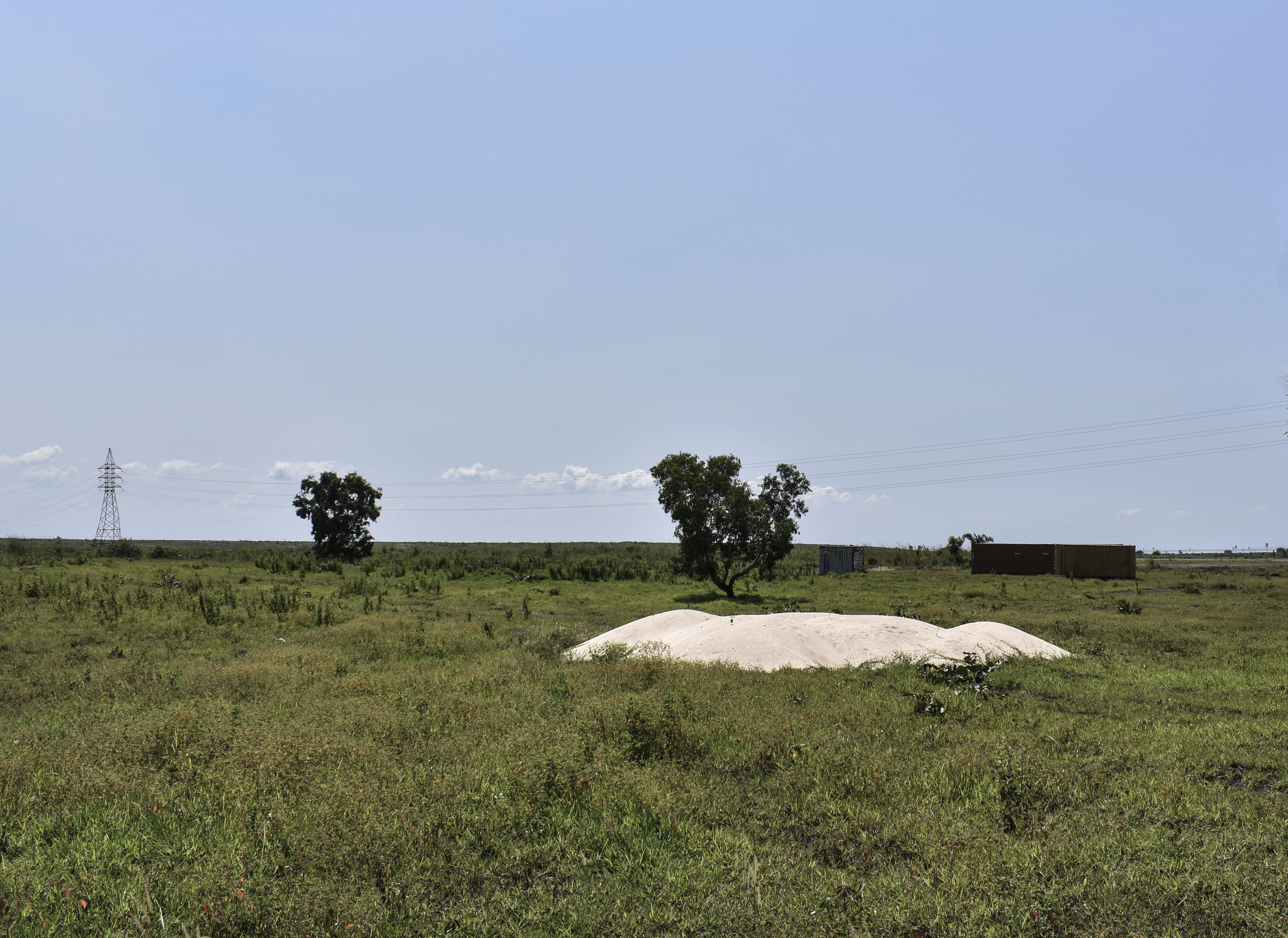 Grave matters: Etienne Tshisekedi’s burial site outside Kinshasa (Simon Allison)awaits the return of his body to the country.
Grave matters: Etienne Tshisekedi’s burial site outside Kinshasa (Simon Allison)awaits the return of his body to the country.
Gilles, a construction worker who is helping to build another seedy hotel nearby, confirms that this is indeed the spot. Felix Tshisekedi, Étienne’s son, was here last week with senior party officials and traditional chiefs to discuss the design of the mausoleum, and architects came along to take measurements. “Maybe I can get a job when they start building,” said Gilles.
That might not happen for a while yet. Étienne died in a Belgian hospital in February last year. He was an old man who had been frail for some time, worn out by the strain of fighting against three consecutive autocratic regimes: that of Mobutu Sese Seko, Laurent Kabila and now Joseph Kabila.
Since his death, his body has been kept in a mortuary in Brussels, awaiting permission from the Congolese government to be repatriated home. That permission has not been forthcoming. President Joseph Kabila is nervous, with reason, that the funeral could ignite simmering resentment towards his unpopular rule.
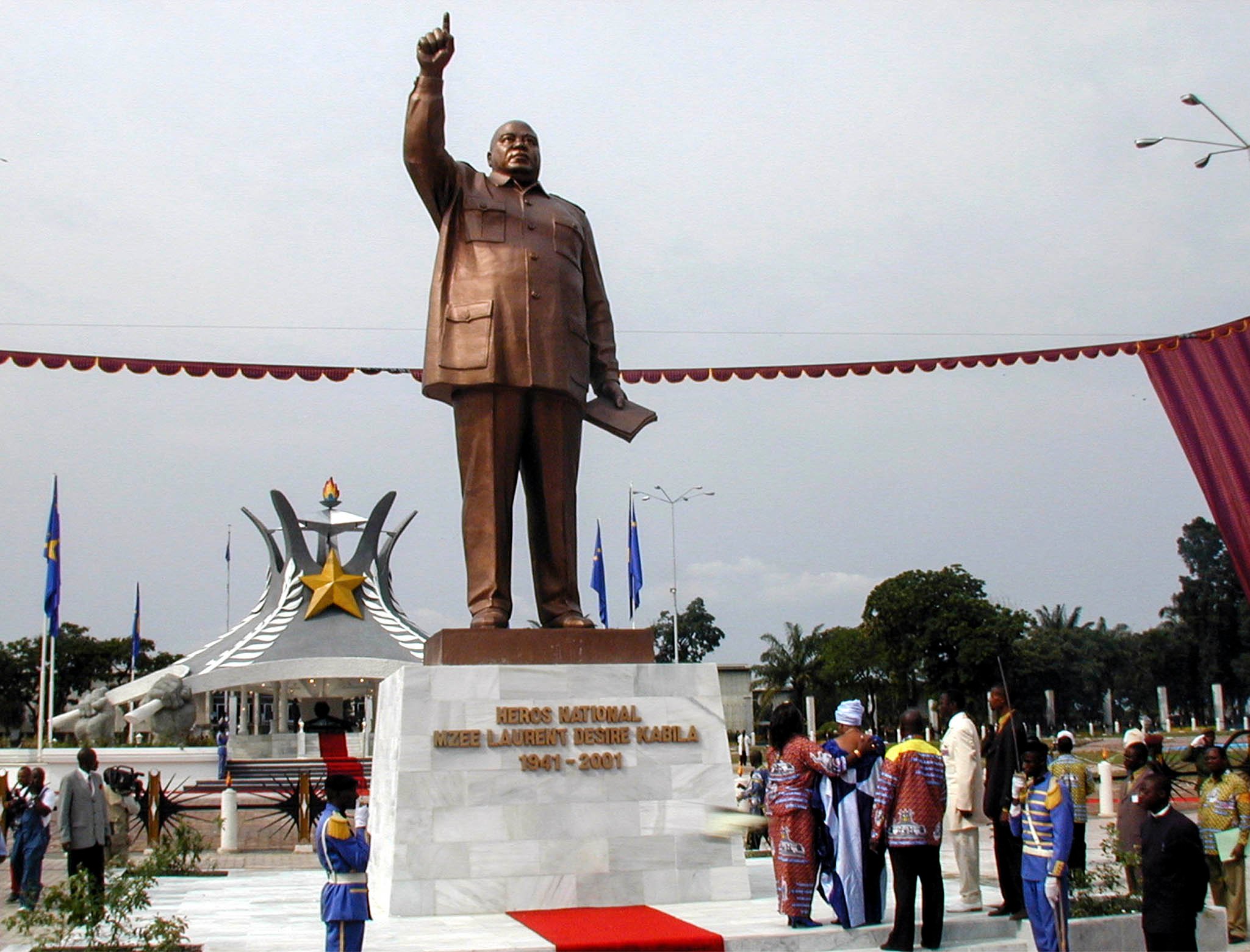 Laurent Kabila (Finbarr O’Reilly/Reuters)
Laurent Kabila (Finbarr O’Reilly/Reuters)
But even in the absence of a corpse, the ghost of Étienne casts a long shadow over this vast, impoverished country of 81-million people, and the election it is nervously gearing up for on December 23, after a two-year delay. In the case of Felix, that shadow is quite literal: a giant portrait of his father adorns a billboard outside the Kinshasa headquarters of his Union for Democracy and Social Progress. The billboard reads: “Étienne Tshisekedi: Immortel”. For Felix, with little political experience of his own, his father’s name is his main source of political legitimacy — and the main reason his own name is on the presidential ballot.
Étienne’s death had profound implications for Kabila, too. Étienne alone among opposition leaders had the name recognition and the broad appeal necessary to unite the country’s disparate and often shambolic opposition groups. Of all the opposition leaders, he had by far the best shot at harnessing the groundswell of anger directed towards Kabila’s dysfunctional, kleptocratic administration, which has failed dismally to improve the lives of people. With Étienne at the helm, there was a chance that the opposition could achieve an electoral victory so crushing as to be beyond dispute — and therefore beyond manipulation.
In his absence, however, the opposition has splintered. The other big names, Moise Katumbi and Jean Pierre Bemba, have thrown their weight behind the unheralded Martin Fayulu after they were excluded from running. Felix Tshisekedi, struggling to contain divisions in his own party, initially joined the Fayulu coalition before deciding to press ahead with his own presidential bid. The opposition vote will be split, which plays straight into Kabila’s hands.
The president keeps his own dead father close, in an elaborate tomb at the entrance to his office in the riverside Palais de la Nation. Four enormous fists, sculpted in cement, support a structure that looks like a giant tent topped with a gold star. The corpse rests in a coffin clad in the old colonial flag and enclosed in glass. Nearby, his likeness is immortalised in a statue that stands nearly eight metres high. It was created by a team of North Korean artists, and the body appears to have more in common with Kim Jong-Il than Laurent Kabila.
Joseph was just 29 years old when Laurent was assassinated, on the afternoon of January 16 2001. Ten days later, Joseph had taken over as president. One of his first acts was to build the mausoleum, enshrining the Kabila name at the symbolic centre of the state. Disputed elections followed in 2006 and 2011, but Joseph prevailed, helped along by the full resources of the state and a distinctly relaxed attitude towards observing the electoral law.
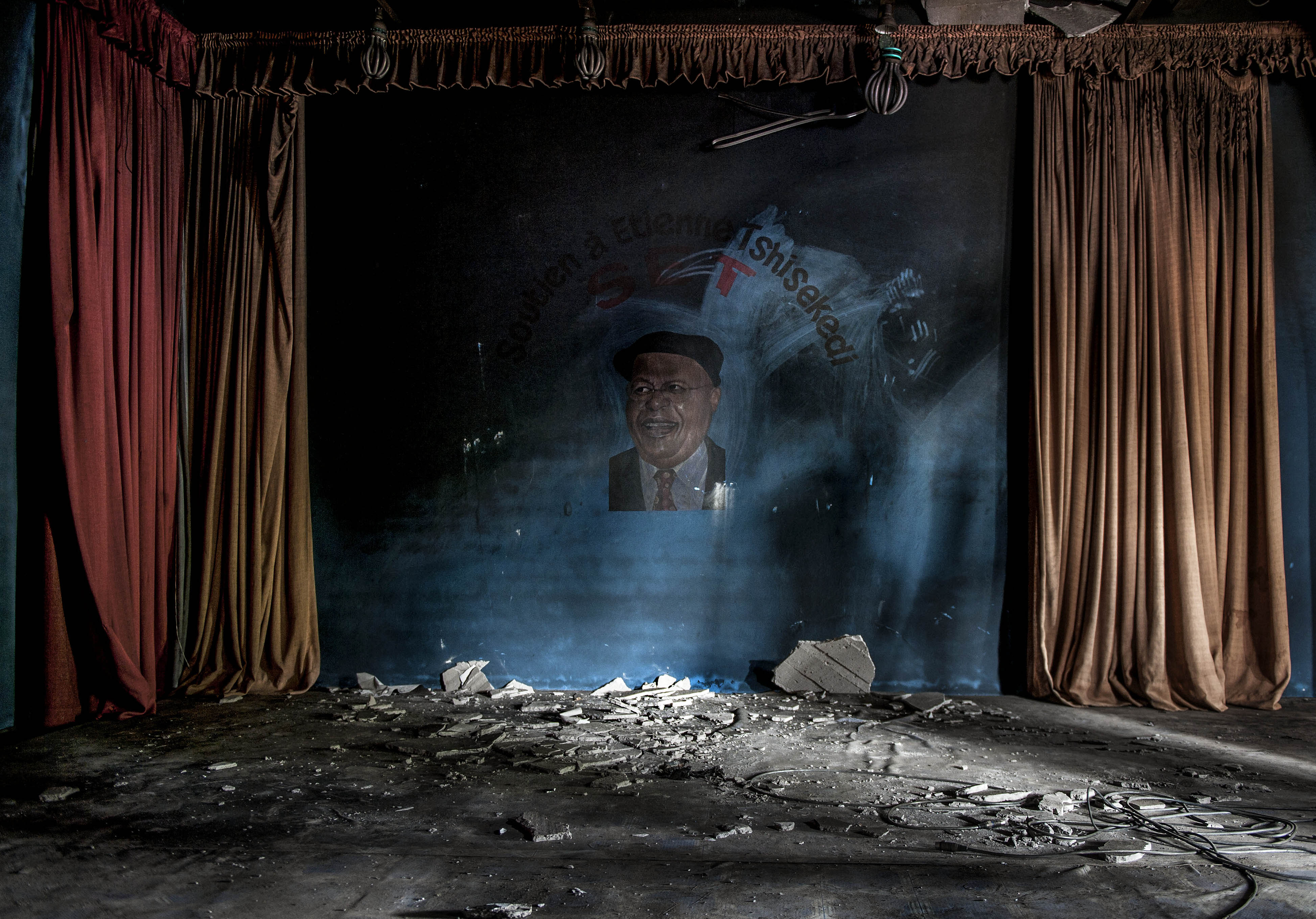 The state stopped the opposition leader’s TV station (left) from broadcasting in the 2011 elections (Paul Botes)
The state stopped the opposition leader’s TV station (left) from broadcasting in the 2011 elections (Paul Botes)
Like Felix, Joseph’s political legitimacy is almost entirely thanks to the ghost of his father, although in recent years he has attempted to forge his own statesmanlike image. He has even cultivated a distinguished salt-and-pepper beard to help him to look the part. But the makeover cannot disguise his administration’s all too obvious shortcomings: the endemic corruption at all levels of government; the inability to deal with multiple conflicts, most recently in the Kivus and the Kasais and in Ituri provinces; the failure to improve living standards; the squandering of the country’s extraordinary mineral wealth.
Joseph now finds himself in a tricky position. He has already served two full terms as president, and the Constitution — which he promulgated — bars him from running again. But he does not seem especially keen to leave office, perhaps aware that a new administration will ask some awkward questions about the source of his wealth. So far, his solution to this problem has been to use every trick in the book to delay the vote, giving him two extra years in office.
A more permanent solution comes in the unlikely form of Emmanuel Ramazani Shadary, a dour, little-known bureaucrat whom the president has hand-picked as his successor. Prior to his selection, and his face being plastered on posters and billboards across the country, Shadary’s only claim to fame is that he once, as minister of the interior, allegedly oversaw a violent crackdown against protesters that was so brazen and so brutal that it earned him a place on a European Union sanctions list.
Shadary was chosen because he is, as Al Jazeera put it, “a die-hard Kabila loyalist” who will allow Joseph to pull the strings from behind the scenes. This perception is encouraged by some of the campaign posters around the country, which picture Joseph gazing menacingly over Shadary’s shoulder.
It is a ploy that worked for Vladimir Putin in Russia, where Dmitry Medvedev kept the president’s seat warm until Putin was allowed to run again. It is far from foolproof, however: in the immediate vicinity of the Democratic Republic of Congo (DRC), both Angola’s Eduardo dos Santos and Botswana’s Ian Khama have found themselves sidelined by their chosen successors.
Nor is there any guarantee that, should Shadary “win” the election, his appointment will be allowed to go ahead. “Kabila symbolises our suffering. If he puts in his boy, nothing will change. We will continue to be poor,” said Stephie Mukinzi, a student activist with the Fight for Change movement, better known by its French acronym, Lucha. “If Shadary is elected, the people will say no. We will mobilise against him.”
Mukinzi stresses that this mobilisation will be peaceful, but not everyone is so sure. Some of Kinshasa’s elite have already secured their Schengen visas and bought their flexible flight tickets, just in case they need to leave in a hurry.
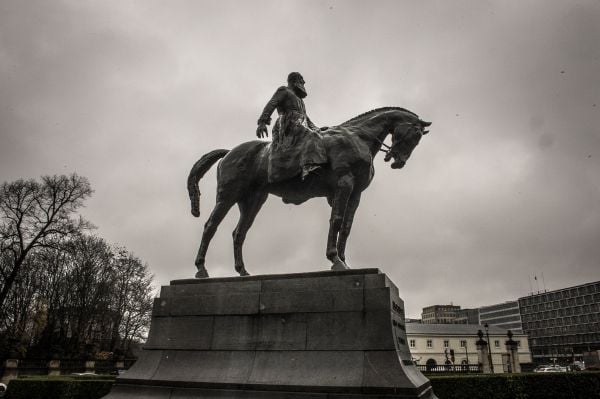 Lest we forget: A monument of King Leopold II in Belgium is a reminder of plunder and murder by The Butcher of Congo. (Wiktor Dabkowski)
Lest we forget: A monument of King Leopold II in Belgium is a reminder of plunder and murder by The Butcher of Congo. (Wiktor Dabkowski)
Congolese history is full of ghosts. “At first, Africans apparently saw the white sailors not as men but as vimbi — ancestral ghosts — since the Kongo people believed that a person’s skin changed colour when he passed into the land of the dead,” writes historian Adam Hochschild, of the moment when the first European ships arrived on Congolese shores. His book, King Leopold’s Ghost, tells the story of the most barbaric ghost of them all: Leopold II, the Belgian monarch who turned the Congo into his own private fiefdom, slaughtering an estimated 10-million people while mercilessly stripping the land of anything that could be sold for profit. The DRC is still reeling from the devastation of those colonial years.
Patrice Lumumba, the first post-independence prime minister, was assassinated in a plot orchestrated by Belgian and American intelligence services. It is sometimes said, usually by journalists and academics, that Lumumba’s ghost haunts the country still, along with the question of how different things may have turned out had he been allowed to implement his brand of radical pan-Africanism.
More recently, there have been ghost-town protests in Kinshasa against Kabila’s rule, the city’s always-bustling streets turning eerily silent as people stay at home and refuse to go to work; more ghost towns in parts of the northeast, as people flee en masse the disastrous combination of an Ebola outbreak and an armed rebellion; and the spectre of an electoral roll compromised by as many as six million ghost voters, according to an audit by the Organisation Internationale de la Francophonie.
There are other major concerns about the conduct of the vote. The independence of the electoral commission has been questioned repeatedly, as has that of the state’s security apparatus. Conflict and instability mean that voting is not possible in some parts of the country, in effect disenfranchising entire districts. The most serious concern, however, is the introduction of electronic voting machines to replace paper ballots.
The machines look like oversize iPads mounted on sturdy black briefcases. In theory, they make sense: in such a large country, the physical distribution and collection of paper ballots is a time-consuming and expensive exercise. But in practice, critics, including the opposition, are worried that many voters — some of whom may never have used a smartphone — will struggle to adapt to the new technology, and that power cuts in some areas could make voting impossible.
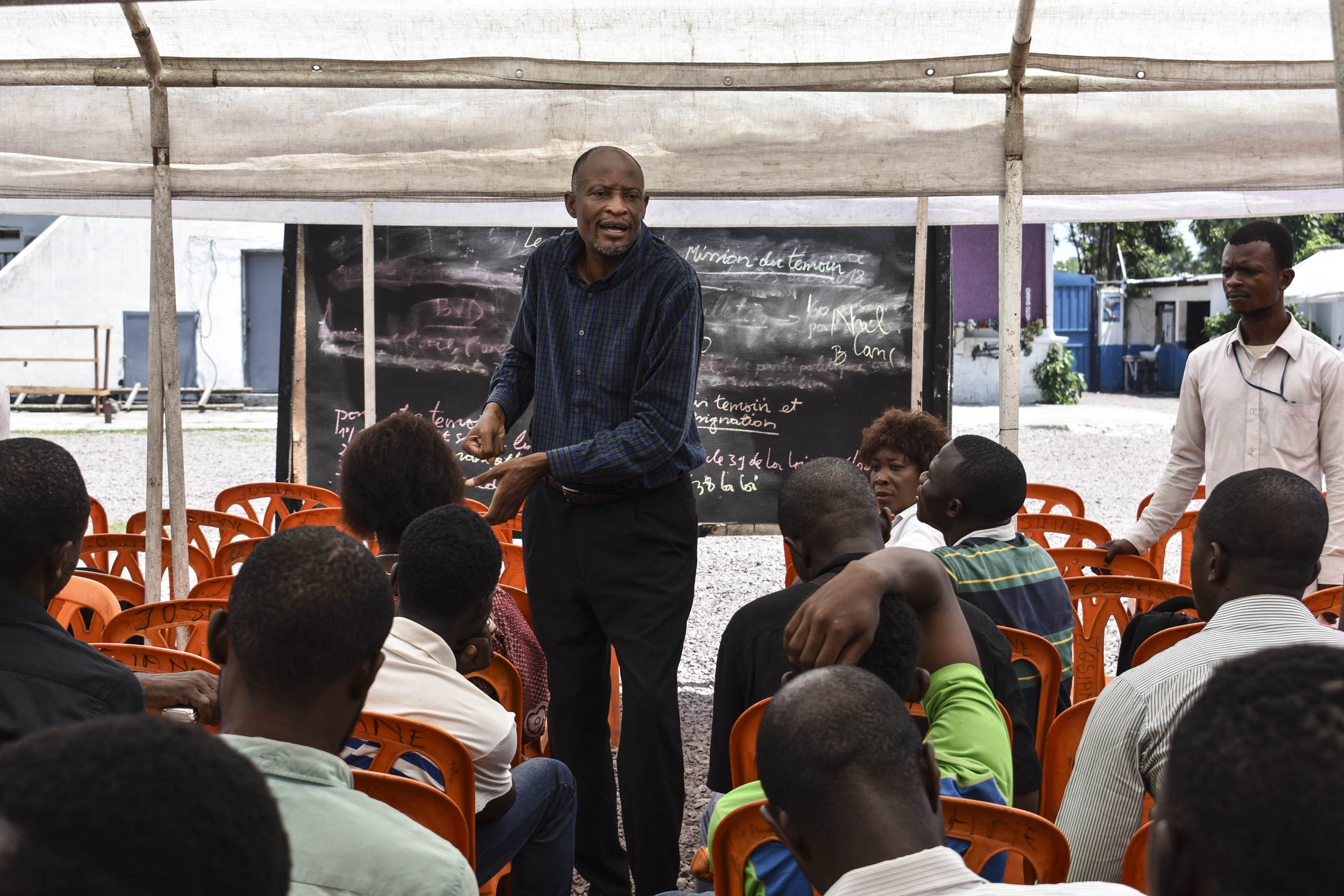 The opposition is gearing up for the December 23 elections. (Simon Allison)
The opposition is gearing up for the December 23 elections. (Simon Allison)
“We want elections, but without the voting machine,” said Jean-Pierre Bengwa, a campaigner for Martin Fayulu’s opposition coalition. “The voting machine is not in the electoral law. If they insist on the voting machines, then it’s not happening,” Bengwa, dressed in flowing white robes and a cardinal’s pointed hat, stands on a busy street corner in central Kinshasa, shouting to passers-by that the time for change has come.
Sylvain Lumu, an expert in Congolese electoral law, says Bengwa is partially right: there is no provision in the regulations for voting data to be transmitted electronically, and no safeguards against interference with that data. It’s not the machines themselves that are the problem, he stresses; the real issue is the lack of transparency and confidence in how the machines work, raising fears that the results will be manipulated by a hidden hand — a ghost in the voting machine, if you will.
Kinshasa’s main drag is the Boulevard Du 30 Juin, named for the date in 1960 when the country gained independence from Belgium. About halfway along it, squeezed in between the boxy office blocks and the shopping malls, is a cemetery. It is full: the graves are packed so tightly together that mourners have no choice but to trample over the dead as they make their way through. The epitaphs, carved into marble, suggest their own stories about Congo’s history.
To our dear Papa, Leonard Tshiamueny Mutantamane, 1929-2006. Your memory will never be sad in our hearts.
Nzevuka Nen Izevuku, 1928-1989. Rest in peace.
Tshiamanyine Balanganayi, 1958-1989. Prematurely snatched from our affections.
Prof Bingoto Mandoko, 1947-1994. We keep you forever in our hearts.
On this particular Thursday evening, as the shadows lengthen, an apparition appears from behind a tombstone. His name is Shikou and he is the caretaker here. He knows the graveyard intimately and conducts informal tours of its most interesting residents: here is a famous singer; here is one of Mobutu’s most feared generals; here is a blanc who never went back to Belgium. If there are any ghosts around, he would know.
“Fantômes?” he says. “I’ve never seen one. When your body is buried, that’s it. I don’t believe in ghosts.”